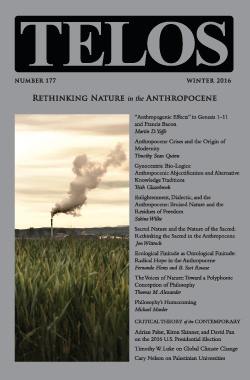In this essay I attempt to sketch out the possibility of a response to the problem of the relation between ethics and politics in Emmanuel Levinas’s philosophy. Levinas’s ethics as first philosophy is revolutionary, and promising, but it leads to a gap between ethics and politics. This is a genuine problem, since depending on how one problematizes this gap and responds to it, one may end up with different, even opposing, views of Levinas’s thought, ranging from the right side of the political spectrum to its very left. In order to respond to this problem, I examine the possibility of a constructive dialogue between Levinas’s ethics and Adorno’s negative dialectics. In particular, I approach the relation between ethics and politics in Levinas from the standpoint of the question of history.
|
The term “Anthropocene” designates the present age of the world, dominated and transformed by human activity. It is therefore an age of crisis, whose central features include not only technological exploitation of the earth, but also a loss of faith in any order, natural or supernatural, that could serve as a guide to human affairs. In this essay, I wish to argue, first, that the roots of this crisis rest with the modern concept of nature, a concept of nature that, as Hans Jonas wrote, “contained manipulability at its theoretical core.” David Pan’s “Carl Schmitt on Culture and Violence in the Political Decision” aims at challenging the widespread view that Carl Schmitt’s decisionism is motivated by violence and pure power. Pan presents his readers to “another Schmitt” that has escaped the attention of many commentators, including Müller, Žižek, McCormick, and Agamben. For Pan, Schmitt’s decision must not be separated from spiritual ideals and cultural values. On the way back from Jerusalem to Ben Gurion airport following a few weeks in Israel in 2016 I settled in expecting to doze off. As usual it was 1 a.m., and I was pretty well done in from nonstop travel. But every taxi cab driver, Jewish or Arab, wants to talk, and I always learn something from these nonacademic conversations. Before long I was hearing things I was not eager to know, but it brought home the human costs of nearly a century of conflict. Telos Press is delighted to announce that Elliot Neaman’s Free Radicals: Agitators, Hippies, Urban Guerrillas, and Germany’s Youth Revolt of the 1960s and 1970s has won first place in the History category at the London Book Festival. Congratulations! Critical Theory of the Contemporary: Election 2016, Environmental Nationalism, and Palestinian ShameIn addition to its main focus on nature and the Anthropocene, Telos 177 (Winter 2016) features a special section of topical writing, introduced here by Russell A. Berman, that continues our ongoing commitment to setting forth a critical theory of the contemporary. Telos 177 is now available for purchase in our store. |
||||
|
Privacy Policy · Data Protection Copyright © 2026 Telos Press Publishing · All Rights Reserved |
||||



